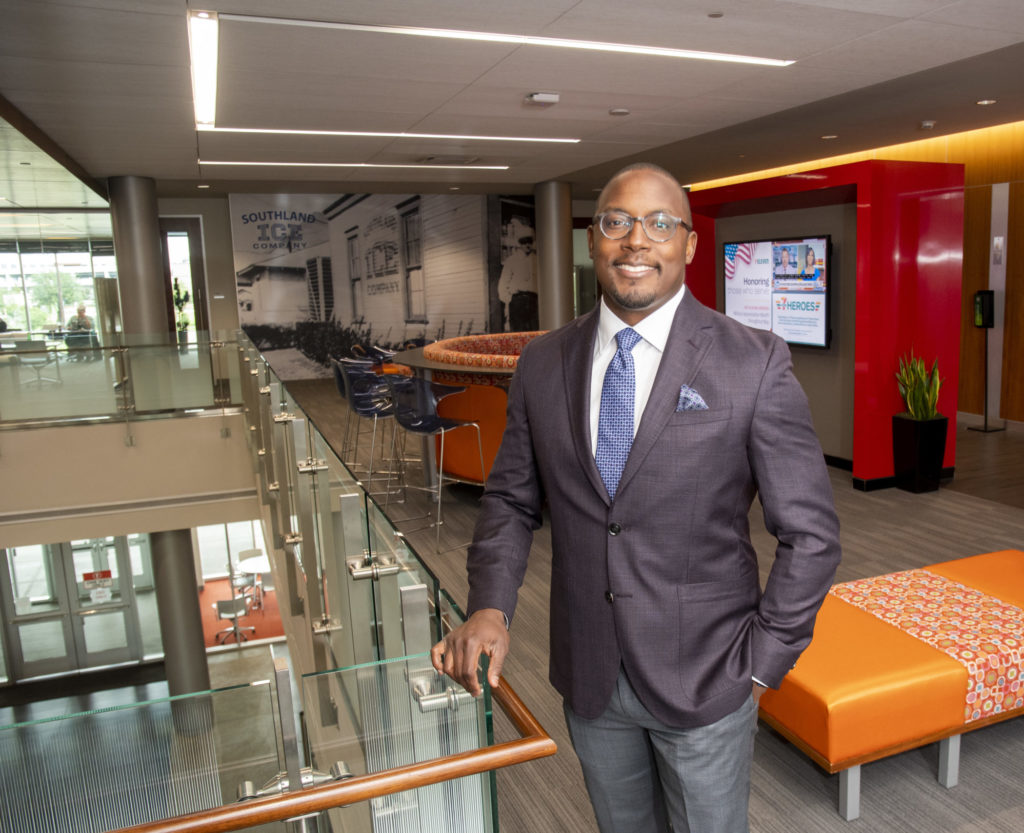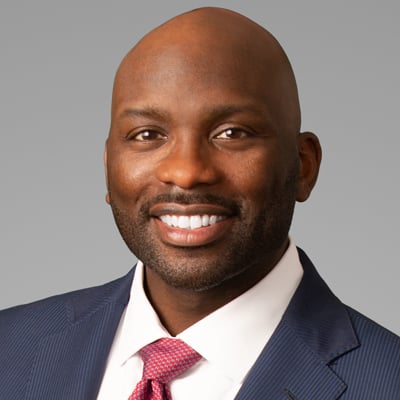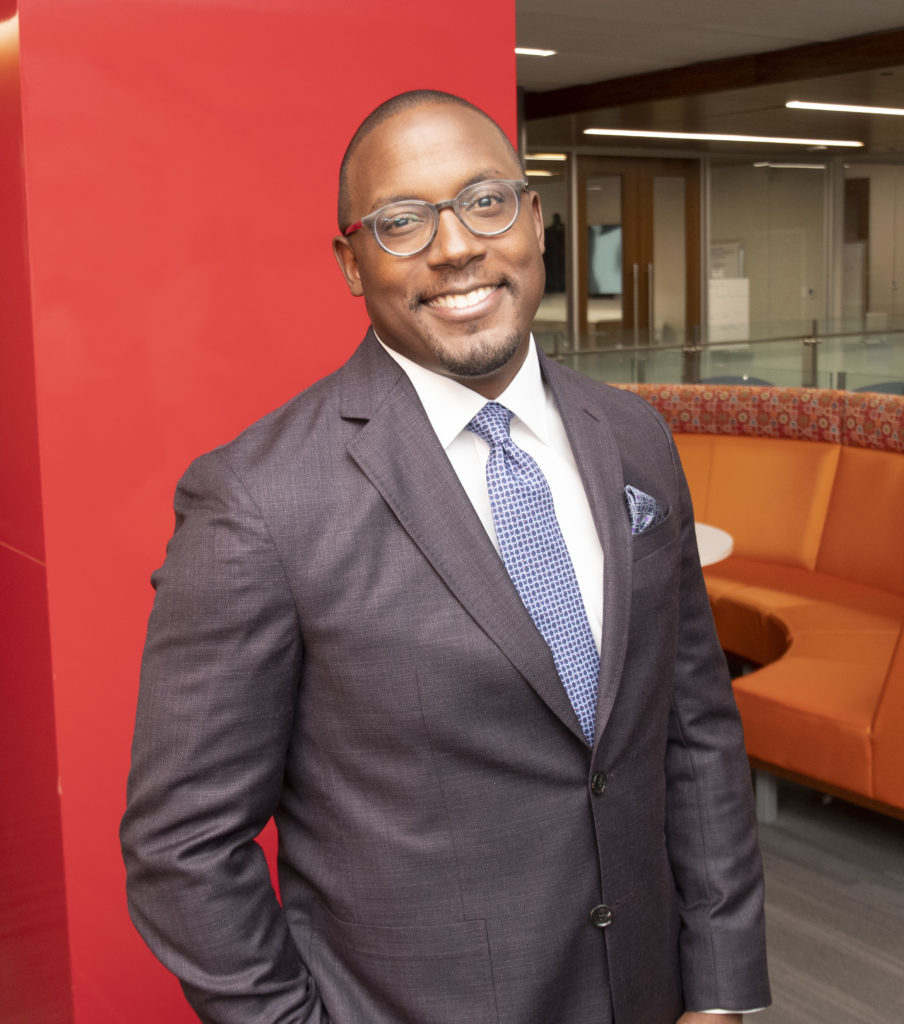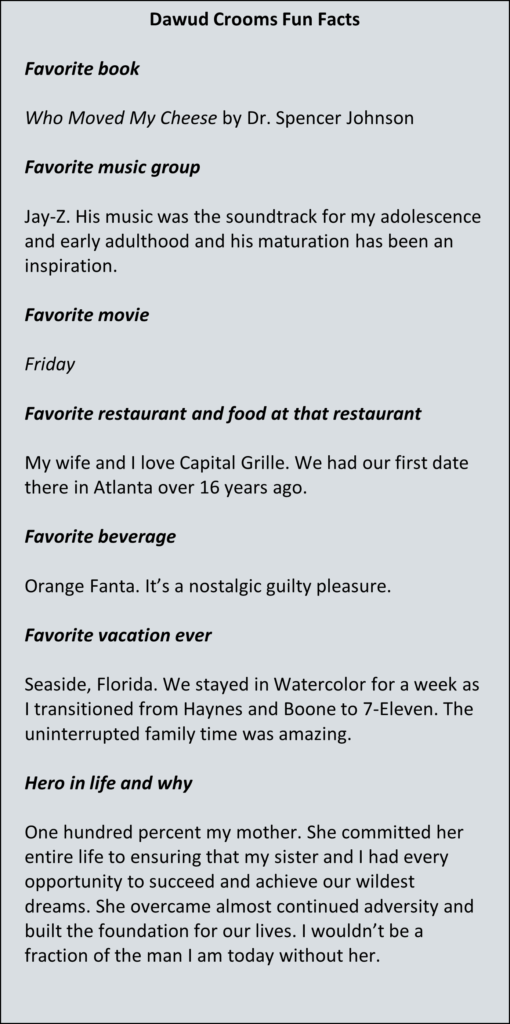
Last March, Dawud Crooms’ house was “in chaos.”
Crooms’ wife, Katherine, took over his North Dallas home office to operate her new integrative psychotherapist counseling practice. Days later, their four children were sent home to do classes remotely because of the Covid-19 pandemic. A couple of days after that, 7-Eleven told its corporate folks to work from home, too.
A reconfiguration of the house was needed. The beds for the kids were combined into one room
“But all the other spaces in the house were taken, so I ended up in one of the kids’ bedrooms setting up a make-shift office and working between my kids’ dresser and the school supplies shelves,” said Crooms, who is 38.
“So I was working on the biggest M&A deal of my life – talking billions of dollars with bankers one minute and then stepping into the next room to answer math and science questions the next minute.”
The biggest deal of Crooms’ life was 7-Eleven’s $21 billion acquisition of Speedway.
Last Thursday night, Crooms, who is senior counsel and lead in-house mergers and acquisitions lawyer for the global convenience store chain, was ready for the transaction to close.
Seventeen months of discussions and negotiations – interrupted by a global pandemic – followed by the examination and approval of tens of thousands of documents related to due diligence, regulatory compliance, intellectual property and more were finally over.
Then at 11:30 p.m., Crooms’ cellphone buzzed. It was outside counsel. There was still one remaining issue holding it all up.
“It’s not an M&A if something doesn’t pop up at the last minute that threatens the whole deal,” Crooms laughs. “A seemingly arcane issue around a closing calculation. It was technical and would seem inconsequential except that millions and millions of dollars would swing one way or the other.”
“Figure it out,” Crooms told those on the phone.
They did.
At 12:01 a.m., Crooms and all the lawyers and bankers – about two-dozen in all – joined together on Microsoft Teams. The calculation had been resolved. One-by-one, those on the call said that the terms and conditions had been met.
“It was really anticlimactic,” he said. “The first 10 minutes, we exchanged pleasantries and then, it was done.”
On Friday, May 14, Dallas-based 7-Eleven, the largest convenience store chain in the U.S., closed its purchase of Ohio-headquartered Speedway, which was the third largest. Combined, 7-Eleven now has nearly 14,000 stores operating across the country with about 80,000 employees and a market cap exceeding $50 billion.
7-Eleven executives involved Crooms from the start.
“From soup to nuts I was involved and this transaction was fundamentally differently form anything else I have handled from a size standpoint,” Crooms told The Texas Lawbook in an exclusive interview after the deal closed. “The level of diligence and integration planning was magnitudes larger.”
PREMIUM SUBSCRIBERS: FIND A SPECIAL Q&A WITH DAWUD CROOMS BY CLICKING HERE.
The Association of Corporate Counsel’s DFW Chapter and The Texas Lawbook have named Dawud Crooms and his team of lawyers at Akin Gump as finalists for the 2020 DFW Outstanding Corporate Counsel Award for M&A Deal of the Year.
On June 3, ACC DFW and The Lawbook will celebrate the achievement of the finalists and announce the winners at a ceremony at the George W. Bush Institute.
“Dawud is one of the best kept secrets in corporate law in Texas,” said Kirkland & Ellis partner Taj Clayton, who nominated Crooms for the award. “We don’t see a lot of African Americans leading multibillion-dollar transactions. Dawud is a decisive and pragmatic thinker and has an excellent business mind.”

Akin Gump partner Tom Yang, who was lead outside counsel on the 7-Eleven-Speedway deal, said the $21 billion transaction had many complexities to solve and hurdles to overcome – not to mention the pandemic that ended face-to-face negotiations – but Crooms never lost focus of the client’s objectives.
“The sheer volume of the responsibility on Dawud was enormous,” Yang said. “There were lots of ups and downs, but Dawud always kept things moving forward. He is excellent at cracking jokes to defuse intense situations at exactly the perfect moment.”
Wilson Chu, a corporate transactions partner at McDermott in Dallas, predicts Crooms will be the general counsel of a Fortune 500 company in the near future.
“Dawud has a high EQ – he’s super smart but very down to Earth,” Chu said. “Most people are good when the issues are black and white, but Dawud understands that there are gray areas with no easy answers, and he is great at finding his way through those to get to the right answers.”
Crooms was born and raised in New Jersey. His father, who was a history professor at a community college in North Jersey, died when Dawud was three. His mother was the first in her family to go to college. She majored in communications at Seton Hall University and dreamed about a career as a radio broadcaster.
“My mother was my rock and foundation,” he said. “After my father passed away, she left her pursuit and began working at our church as an administrative assistant to the pastor. She ultimately found her passion educating children and spent her career running the church’s day care.”
Crooms received scholarships from NASA and UNCF to attend Morehouse College in Atlanta to study liberal arts with the goal of becoming a software engineer.
“These scholarships were critical as I wouldn’t have been able to attend Morehouse without them, and they allowed me to fully immerse myself in my college experience without the stress of financing my education or living expenses,” he said.
Crooms became active in student government and became student body president. He worked closely with the Morehouse Business Association, which introduced him to the world of finance. As a result, he added economics as a minor.
JPMorgan Chase hired Crooms in 2004 in its investment banking operations division. The first year, he worked in software development and wrote code for the bank’s rapid development team that worked directly with the derivatives risk management team and built risk management modules and analyses in a proprietary system developed by JPMorgan.
Crooms quickly learned he liked the business side better. He worked two years as an analyst and then as an associate leading a small team analyzing risk for the derivatives trading desk.
Thoughts of law school never entered his mind until 2006. He was a newlywed and a father-to-be.
“My wife Kathrine did not share my love for the New York metro area as a mother-to-be, and there were limited options in derivatives trading or risk management outside of major financial centers,” he said. “Katherine recommended that I consider a career in law as an alternative. Her mother is an attorney and spent her career working for legal aid in metro-Detroit. She was exposed to a number of attorneys throughout her life and thought that I would enjoy a career in law.”
Crooms was a first-year student at the University of Michigan Law School when he received a call from then-Haynes and Boone partner Tom Yang, who invited Crooms to Dallas for a one-week, end-of-summer program.

“Dawud had fantastic grades and he was highly sought after by law firms on the East Coast,” Yang said. “So, I just cold-called him. I know my voice with a Texas accent didn’t match what Dawud was seeing as my photo on the firm’s website.
“I am just really glad he answered the phone that day,” Yang said.
Crooms joined Haynes and Boone in 2010 working on M&A activity and corporate securities.
“The partners at Haynes and Boone took a personal interest in me, my family and my development,” he said. “I believed that they saw something in me and were committed to ensuring that I had access to the opportunities I needed to succeed.”
Haynes and Boone and Crooms represented 7-Eleven in a handful of matters and had worked with David Colletti, a former Haynes and Boone lawyer who joined the in-house legal department at 7-Eleven in 2012.
The pair were playing basketball at a Dallas Young Lawyers Association event when Colletti, who is now vice president of M&A at 7-Eleven, told Crooms about an opening in their legal department.
Crooms said he was in his sixth year of practice at Haynes and Boone and had no interest in leaving, but that the 7-Eleven position “provided a good blend of sophisticated work and an ability to have a more balanced family life.
“The opportunity to be the lead M&A lawyer at a global company and a widely known and respected brand so early in my career made the opportunity very interesting,” he said. “The quality of the 7-Eleven team, the positive experience with David and the opportunity to spend more time with my family made the opportunity one I couldn’t pass up.”

Crooms said 7-Eleven looks at about 50 acquisition opportunities annually but moves forward with only a few.
Prior to the Speedway transaction, 7-Eleven’s last purchase in 2018 when it bought Sunoco’s retail business for $3.3 billion. The Sunoco deal included 1,100 stores in 18 states and a 15-year fuel supply agreement. It also helped jump-start 7-Eleven’s burgeoning restaurant platform, particularly Laredo Taco Company.
“I certainly thought Sunoco might be the biggest deal of my career,” he said. “Come to find out, it was only a fraction of the size.”
In fall 2019, a group of activist investors at Marathon Petroleum Corporation was pushing executives to sell the Speedway subsidiary.
Investment bankers were actively marketing the assets, and 7-Eleven, as the nation’s largest convenience store chain, was an obvious potential buyer.
In December 2019, 7-Eleven’s M&A team, led by Colletti and the company’s CFO, made Crooms part of an internal swat team of a handful of key people to “start kicking the tires.”
“We knew Speedway the company and we knew Speedway the brand, but we needed to look under the hood to see if there were synergies there for a successful deal,” Crooms said. “We quickly realized there was a ton of opportunities for us. The footprint and overlap were very complimentary. We realized that Speedway was a phenomenal fit.”
The next step was hiring outside counsel.
“I conducted an assessment of each of the firms 7-Eleven previously used and solicited bids and proposals from several others,” Crooms said. “The primary criteria were sophistication and breadth of practice, diversity of the legal team and the leadership team of the respective law firms and the ability to deliver high quality legal services at competitive and flexible rates.”
Crooms, Colletti and the M&A team decided to hire Akin Gump’s Yang, who also led the Sunoco transaction, to be a lead outside advisor on the deal.
“Tom and the Akin team have consistently done a good job of fielding a talented team with diverse backgrounds that deliver on time and within budget,” Crooms said. “After a relatively extensive process of vetting firms, the legal team selected Akin and Tom. They did a great job representing the company and successfully completing the Sunoco transaction.
“Due to their familiarity with 7-Eleven’s business, their continued representation of 7-Eleven through the years and their success in the Sunoco transaction, they were the frontrunners for this engagement and were selected again,” he said.
Yang was skiing in Deer Valley, Utah, when he got the call from Crooms in mid-January.
“I recognized right away that this was a truly transformational deal for 7-Eleven,” Yang said.
Crooms and the 7-Eleven team made multiple trips to Speedway’s headquarters in Enon, Ohio, for face-to-face negotiations.
“We certainly locked horns and negotiated over critical matters, but we also spent some quality time with their leadership and developed solid relationships, which was very meaningful,” he said.
That became especially important in early March.
Crooms said he and other 7-Eleven leaders in Dallas received some initial calls in late February from the parent company officials in Japan asking “some insightful questions” about the potential impact Covid-19 could have on operations and thus on the transaction.
“In the U.S., Covid was still a foreign issue,” he said. “But our parent, which is famous for our detailed operational plans, wanted to know if this was the time to implement a transaction and do an integration. A couple weeks later, it was clear it was a U.S. issue, too.”
There are many aspects of the Speedway deal that Crooms and Yang cannot discuss because of the signed nondisclosure agreement.
Industry insiders were quoted in various news media sources saying negotiations came to a near stop by the end of March.

7-Eleven lawyers shifted their focus in mid-March to operational matters – from due diligence on the transaction to obtaining enough face masks for employees, analyzing and implementing federal, state and local Covid-19-related health safety standards and supply chain issues.
“We deal lawyers turned into regulatory and compliance lawyers overnight,” Crooms said.
7-Eleven executives and the M&A team had to ask some important questions before deciding to go back to the negotiating table with Marathon.
Crooms said 7-Eleven executives at the parent company in Japan are famous for their precise and detailed operational planning processes.
“Our leadership team often refers to VUCA environments (volatile, uncertain, complex and ambiguous) and it is hard to imagine a more VUCA environment than Covid,” he said. “Trying to understand what impacts are lasting and which are temporary in the context of a transformative transaction created significant additional deal and integration planning complexity.
“There was a lot of uncertainty because of Covid about the impact it could have on our operating environment,” he said. “What does the convenience store industry look like on the other side of this? Kids were not going to school and parents were not going to work, so would they still need as much gas?
“The competition for an asset of this quality also added an uncertainty,” he said.
Within a month, both sides were back at the virtual negotiating table.
“There were days or weeks when we took two steps forward and one back,” he said.
Not being able to meet in person and across the table from the other side from April forward certainly made it more difficult.
“Even when you are not face-to-face with the other side, normally you are still in the same room with your own team and can brainstorm ideas and have free-for-all conversations,” Crooms said. “Even that was impossible. Nope. I was stuck in the kids’ bedroom.”
On Aug. 2, 7-Eleven announced it had an agreement to purchase Speedway for $21 billion.
“Dawud’s people skills are most impressive,” Yang said. “He knows how to read people and then come up with solutions. It is unlikely to leave a conversation with Dawud and not have an upbeat outlook.”
